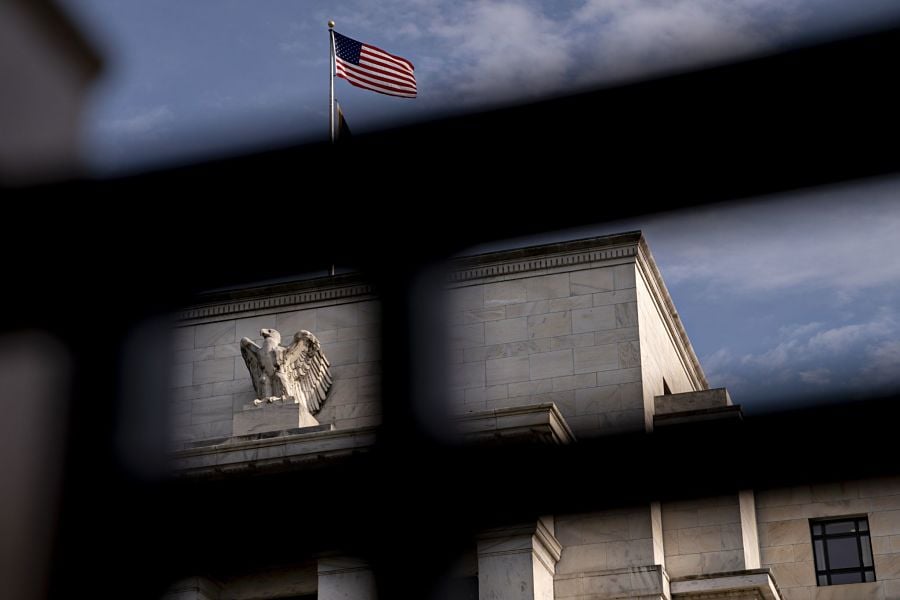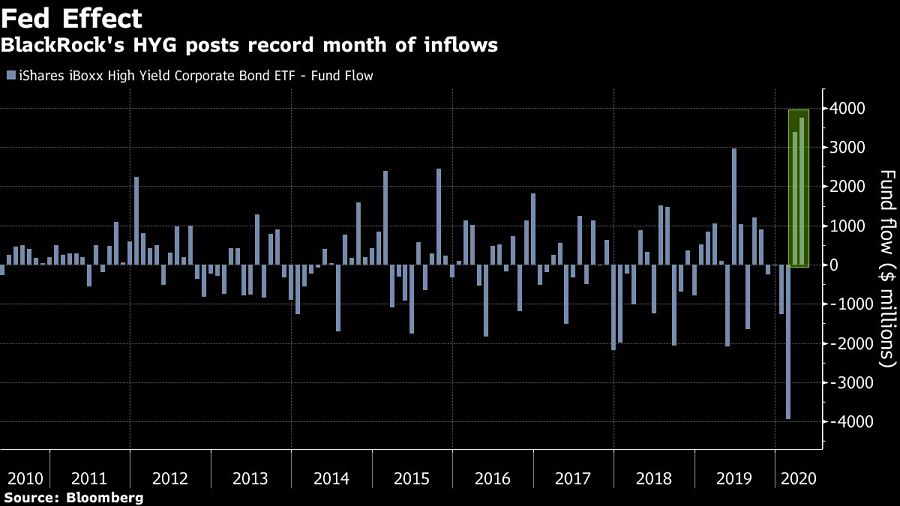

As the Federal Reserve wades into the market for bond ETFs, investors are guessing where it’ll make the biggest splash.
Exchange-traded funds eligible to be purchased by the central bank already got a boost in anticipation of a big new owner. Now that the Fed has started buying, figuring out the ETFs it will target can be lucrative.
Wall Street has been betting heavily on industry giants such as the $45.5 billion BlackRock’s iShares iBoxx $ Investment Grade Corporate Bond ETF (LQD) and the $21 billion iShares iBoxx High Yield Corporate Bond ETF (HYG). The $24.6 billion Vanguard Short-Term Corporate Bond ETF (VCSH) and the $15.9 billion iShares Short-Term Corporate Bond ETF (IGSB) -- which track debt due in less than three years -- are also seen as likely to be bought.

Getting it right matters because the Fed’s announcement that it will buy ETFs sparked a rally in some funds, with LQD up more than 10% since March 23. That rally is likely to extend in the ETFs it targets.
The Fed's primer on the Secondary Market Corporate Credit Facility says that its individual bond purchases will be limited to securities with maturities of five years or less. While the Fed hasn’t said that that applies to ETFs, Elya Schwartzman says it’s reasonable to think the Fed will prioritize funds that track shorter-dated debt.
“That makes the most sense since you want to support companies’ ongoing ability to refinance for the next year or two,” said Schwartzman, who spent nearly a decade at BlackRock before founding ES Investment Consulting in January. “What is the actual goal we’re trying to achieve here? You want to achieve short-term solvency and the ability to fund operations.”
On May 4, the New York Fed said it expects to begin purchasing shares of eligible ETFs in early May, an announcement that Bank of America strategists took to mean “any day now.” The Fed introduced the corporate bond buying program on March 23 to cushion the economic blow from the coronavirus, and expanded it in early April to include debt from companies that recently lost their investment-grade rating.
It’s also possible that policy makers would purchase ETFs with defined maturity dates, according to Bloomberg Intelligence. Unlike a typical ETF, such funds would terminate upon reaching maturity and save the Fed the step of having to sell the product. Defined maturity ETFs dated through 2025 have roughly $17 billion in assets, BI said.
“Focusing on ETFs with set expiration dates would allow the central bank to avoid reentering the market as a seller, making it easier to reduce the balance sheet of the special-purpose vehicle without hurting asset prices,” BI analysts James Seyffart and Eric Balchunas wrote in a note this week.
ETFs such as the $1.8 billion Invesco BulletShares 2021 Corporate Bond ETF (BSCL) or the $1.4 billion iShares iBonds Dec 2021 Term Corporate ETF (IBDM) could potentially qualify, the analysts wrote. Still, they expect that any such targeted purchases will play “second fiddle” to ETFs such as LQD and HYG, given that the program’s goal is broad exposure to U.S. corporate bonds.
While BlackRock’s ETFs have been among the biggest beneficiaries so far, it’s possible that the program will lean toward other issuers, according to Peter Tchir of Academy Securities. BlackRock, the world’s largest asset manager and ETF issuer, has been charged with running the Fed’s three debt-buying programs.
The firm said it would waive investment advisory fees on ETFs it buys on behalf of the Fed. Though that would make buying other issuers’ funds more expensive, it might shield BlackRock from criticism, Tchir said.
“My guess is BlackRock will weight towards other firms’ products where they can,” said Tchir, Academy’s head of macro strategy. “Perception might count.”
With that in mind, funds such as State Street’s $6.2 billion SPDR Portfolio Short Term Corporate Bond ETF (SPSB), VCSH and State Street’s $9.7 billion SPDR Bloomberg Barclays High Yield Bond ETF (JNK) could qualify, Tchir said.

Rajesh Markan earlier this year pleaded guilty to one count of criminal fraud related to his sale of fake investments to 10 clients totaling $2.9 million.

From building trust to steering through emotions and responding to client challenges, new advisors need human skills to shape the future of the advice industry.

"The outcome is correct, but it's disappointing that FINRA had ample opportunity to investigate the merits of clients' allegations in these claims, including the testimony in the three investor arbitrations with hearings," Jeff Erez, a plaintiff's attorney representing a large portion of the Stifel clients, said.

Chair also praised the passage of stablecoin legislation this week.

Maridea Wealth Management's deal in Chicago, Illinois is its first after securing a strategic investment in April.
Orion's Tom Wilson on delivering coordinated, high-touch service in a world where returns alone no longer set you apart.
Barely a decade old, registered index-linked annuities have quickly surged in popularity, thanks to their unique blend of protection and growth potential—an appealing option for investors looking to chart a steadier course through today's choppy market waters, says Myles Lambert, Brighthouse Financial.
